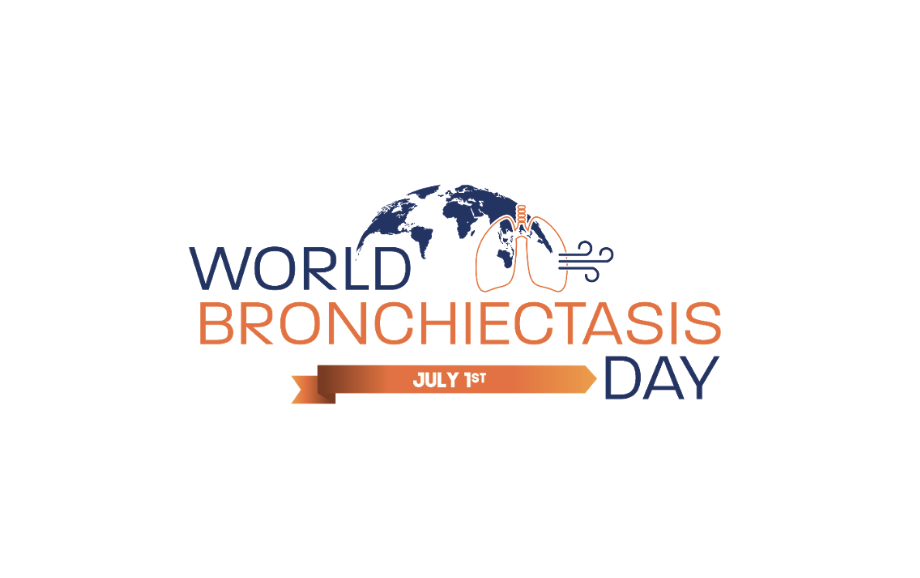

Guest Blog: Raising Awareness, Sharing Knowledge: Celebrating World Bronchiectasis Day July 1st
By: Christina Hunt, BS, RRT, Director of Bronchiectasis and NTM Research and Education for the COPD Foundation.
Bronchiectasis is a chronic lung condition with symptoms including a productive cough, frequent lung infections and inflammation due to mucus pooling, and abnormal widening of the airways. It can occur at any age1 and is diagnosed by chest computed tomography (CT) scans. Bronchiectasis can cause a significant burden on patients and their families. It can lead to accelerated lung function loss, resulting in long-term disability and premature death in adults.2 It has been associated with differences in morbidity and mortality outcomes in socially and/or economically disadvantaged people.3 Although often referred to as a rare disease, research suggests that diagnosed cases reflect a relatively small portion of the overall bronchiectasis population4 and that prevalence is increasing globally.5
Early diagnosis and quick and effective bronchiectasis treatment are the most important factors affecting positive outcomes.6 The goals of therapy should be to improve airway mucus clearance; prevent lung infection; reduce airway inflammation; and improve or maintain quality of life.7
In 2022, the COPD Foundation’s Bronchiectasis and NTM 360 division recognized the need to increase global awareness of bronchiectasis. Partnering with more than twenty global patient advocacy organizations, professional societies, and key opinion leaders, they declared July 1 World Bronchiectasis Day. A global planning committee co-chaired by Dr. Tim Aksamit, Medical Director of Bronchiectasis and NTM 360 at the COPD Foundation, and Professor James Chalmers, EMBARC Chair and British Lung Foundation Chair of Respiratory Research, University of Dundee assists in organizing World Bronchiectasis Day. The global planning committee comprises of patient advocates, representatives from collaborating organizations and societies, and leading experts. The inaugural event was a global success. #WorldBrochiectasisDay was trending on social media and the diagnosis gained more awareness and interest internationally.
This year on July 1, 2023, organizers from around the world will again coordinate activities to increase awareness for bronchiectasis in hopes of identifying the many undiagnosed patients living with bronchiectasis. A global schedule of events is underway to have educational and awareness offerings around the clock on World Bronchiectasis Day. The organizing committee asks the patient, caregiver, researcher, and health care provider community to share stories of diagnosis, treatment, and hopes for the future of bronchiectasis. Together the global community can make a difference and bring more awareness to bronchiectasis.
Join us in celebrating and spreading the word about #WorldBronchiectasisDay on July 1, 2023. For more information surrounding World Bronchiectasis Day visit www.WorldBronchiectasisDay.org.
The COPD Foundation is a member of the National Health Council. For more information on NHC membership, please email membership@nhcouncil.org.
References
- Chang AB, Fortescue R, Grimwood K, et al. Task Force report: European Respiratory Society guidelines for the management of children and adolescents with bronchiectasis. Eur Respir J 2021; in press. doi: 10.1183/13993003.02990-2020.
- Loebinger MR, Wells AU, Hansell DM, Chinyanganya N, Devaraj S, Meister M, Wilson R. Mortality in bronchiectasis: a long-term study assessing the factors influencing survival Eur Respir J. 2009 Oct;34(4):843-9. doi: 10.1183/09031936.00003709. Epub 2009 Apr 8.
- McCallum GB, Chang AG Good enough’ is ‘not enough’ when managing Indigenous adults with bronchiectasis in Australia and New Zealand. Respirology 2018; 23: 725–726. doi:10.1111/resp.13291.
- Weycker D, Hansen GL, Seifer FD. Prevalence and incidence of noncystic fibrosis bronchiectasis among US adults in 2013. Chronic Respiratory Disease. November 2017:377-384. doi:10.1177/1479972317709649.
- McShane, PJ and Tino, G. Bronchiectasis. Chest. 2019 Apr;155(4):825-833. doi: 10.1016/j.chest.2018.10.027.
- Lesan A, Lamle AE. Short review on the diagnosis and treatment of bronchiectasis. Med Pharm Rep. 2019;92(2):111-116. doi:10.15386/cjmed-1060.
- Chalmers JD, Aliberti S, Blasi F. Management of bronchiectasis in adults. Eur Respir J. 2015 May;45(5):1446-62. doi: 10.1183/09031936.00119114. Epub 2015 Mar 18. PMID: 25792635


